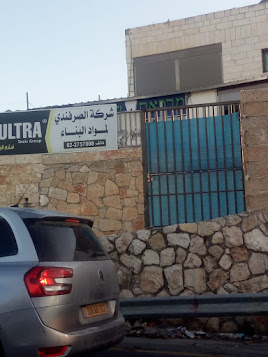What are things really like between the Jews and Arabs who live in the territories? Divided into Areas A, B, and C, under the Oslo Accords, you'd think there wouldn't be much congress between the respective populations of these areas. Jews, for example, are forbidden entry into Area A under Israeli law. But there is more interaction between the sectors than one might expect. A short drive from my apartment in Efrat to the highway that connects us to Hebron or Jerusalem, offers evidence that Oslo or no Oslo, the two populations mix in everyday ways.
Just outside the northern gate of Efrat, lies the Arab city of Dheisheh, in Area A. Area A is under the exclusive rule of the Palestinian Authority with entry to Jews forbidden. Efrat is in Area C, under Israeli rule. Arabs may enter Efrat to work or conduct business, and to shop. But Jews can never enter Dheisheh.
But the Arabs of Dheisheh are enterprising. They see opportunities for commerce with the Jews of Efrat.
This is expressed by, for instance, this pop-up car parts concern, just outside the north gate of Efrat. It looks as though it was built on a shoulder, but not too long ago, there was no shoulder. The owner created one, specifically to court Efrat patrons. As far as I know, he is not paying for the privilege of using this invented space, and no zoning czars prevented this space from coming into existence. He's for sure not paying taxes, and no one is kicking him out.
In the distance, you can see illegal Arab homes that have been built up right against the Jewish homes of the Dagan neighborhood of Efrat, where one can see a communications tower.


On the other side of the road is Sarafindi, a hardware store. The Jews of Efrat are happy to buy from Sarafindi, an Arab-owned and run establishment. The store is clean and well set-up. The prices are good. The service is superb and polite.
Not to be outdone, we next we come to the Elyaakubi hardware store. Note the prominent signs that are mostly in Hebrew, with a bit of small font text in Arabic, at bottom. The signs tell the story: Elyaakubi, an Arab of Dheisheh, wants the Jews of Efrat to come and buy his wares. Hence the nice big friendly Hebrew signage.
Just before the bend in the road that leads to highway 60, we see an impromptu Arab garbage dump next to a small guard house, where IDF soldiers are sometimes posted on patrol. The Arabs find it very convenient to dump their garbage at the bottom of this hill. This did not make Efrat very happy. We attempted to offer a solution in the form of the green garbage "frog" you see here, now overflowing with trash. Our "solution" appeared to worsen the situation. There is now more garbage than ever before. I guess the trash receptacle sanctioned the area as a place to offload domestic refuse.
Next up, a car wash. Again, the prominent Hebrew signage. The conclusion is obvious: who says they don't want to have anything to do with their Jewish neighbors? They definitely want our patronage.


This young boy came out, as I was snapping photos. He was concerned, a bit suspicious. He asked me in Hebrew, "What's wrong? Is everything okay?"
I did my best to reassure him. His eyes followed our car as my husband drove us away.
As we near the intersection of Efrat, Dheisheh, and highway 60, to the right is the red sign warning us that we are at the entrance to Area A, and that it is forbidden for Israelis to enter. The larger sign is a municipal welcome sign, all in Arabic.
Past the red sign, you can see the highway that leads to Jerusalem. Both Arabs and Jews drive on the road in either direction, freely.
On the other side of the road is an auto-body shop, Arab-owned, again with prominent signage in Hebrew. The sign says:
Mercaz HaShalom [Peace Center]
Body-Shop and Paint
Under Management by Maher
All indications are that the Arabs of Area A are happy to do business with the Jews of Area C. And the reality is that the Jews on the hilltops of Efrat can't come to Mohammed in Dheisheh, so Mohammed is coming to Efrat.
Some Efratians are naïve. They see the local Arab desire for Jewish custom as tiny seeds of peace.
Other Efratians are more like me. We think: They're happy to take our money, as long as we're here. They take pains to encourage our business. But they would, of course, much prefer we Jews would sink into the earth, disappear, and be gone for good, their giant Hebrew-lettered "Peace Center" signs notwithstanding. And they wouldn't mind lending a hand to making that happen, when push comes to shove.












































